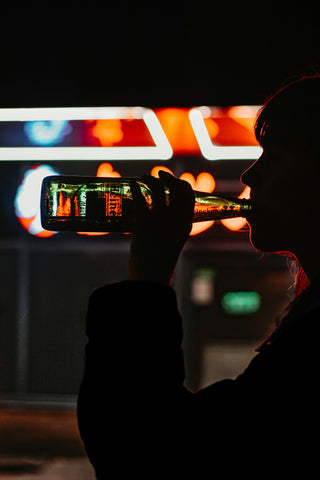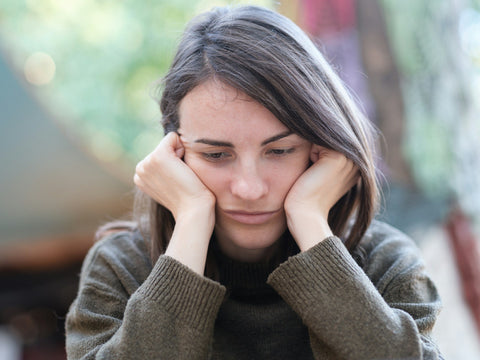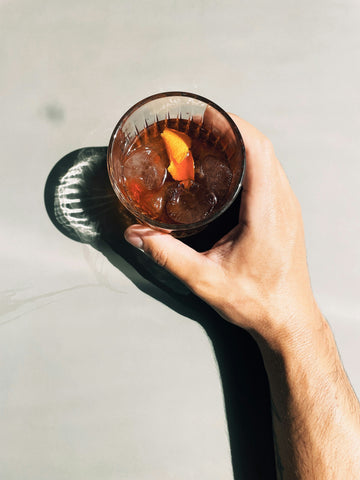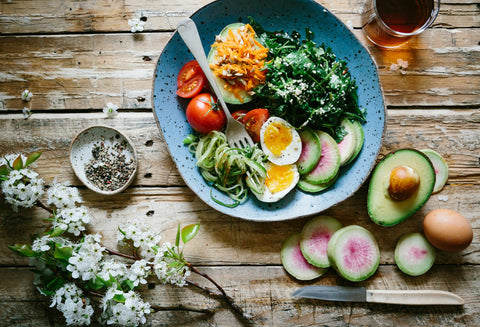Hangxiety is a word that only came into existence in the last few years. It’s a portmanteau of “hangover anxiety” that is often used to describe the feelings of stress, anxiety and dread when you wake up after a night of heavy drinking.
The Definition of Hangxiety - What Does It Really Mean?
Ever woken up after a night of revelry only to be greeted by a pounding headache, a queasy stomach, and a nagging sense of worry and unease? If so, you might be experiencing “hangxiety”, and you won’t be the only one.
While anxiety is common in adults across the UK, with a 2023 survey revealing that 60% claimed to have experienced anxiety that interfered with their daily lives in the past two weeks, the term ‘hangxiety’ refers only to those feelings surfacing after a person has consumed alcohol.
The term has gained popularity in recent years, in part because it perfectly describes those heightened feelings of anxiety and unease after a night of excessive drinking (though in some cases the amount of alcohol does not even need to be excessive). Also, thanks to mental health becoming a far less taboo subject, exploring the impact alcohol can have on the way we feel, even after we’ve stopped drinking, is certainly a conversation worth having.

Symptoms of Hangxiety
Pinpointing the symptoms of severe hangxiety can be beneficial for lots of reasons. Being able to acknowledge what’s happening to you can be a helpful first step in reducing your symptoms. It’s also useful to understand what isn’t hangxiety so that you can react accordingly should other symptoms occur.
Physical Symptoms
From headaches and nausea to fatigue and muscle aches, hangxiety can manifest in various physical symptoms that can leave you feeling drained and unwell. You might also feel shaky, be unable to get to sleep, experience breathlessness and have a racing heart as your body tries to break down and get rid of the alcohol. However, if any of your physical symptoms don’t subside, feel particularly intense or become unmanageable, you may wish to seek professional medical advice.
Emotional Indicator
Feelings of restlessness, worry, guilt, and even panic are common emotional indicators of hangxiety after a night of drinking. These feelings can be scary and very overwhelming but remember, you’re not alone, and help is available.

What Causes Hangxiety?
When trying to understand what causes hangxiety, it’s important to note that those who are affected by anxiety without drinking are more likely to suffer from these anxious and stressful feelings after a night of drinking.
Another factor that can determine whether hangxiety will rear its ugly head is the amount of alcohol a person consumes, as well as your general alcohol tolerance (or rather alcohol intolerance) levels. The more you drink, the more likely hangxiety will come a-knocking the next day.
If you are a person who experiences memory loss and blackouts after drinking alcohol, the upset and confusion of not being able to piece together the events of the previous evening can also (unsurprisingly) intensify hangxiety symptoms.
Identifying Hangxiety Triggers:
Hangxiety can be triggered by a variety of factors, including the amount of alcohol consumed, dehydration, and even the type of alcohol imbibed. Additionally, individual differences in brain chemistry and psychological factors can also play a significant role. So your emotional state before you start drinking can play an important part in determining what happens the next day.
Even factors such as eating a decent meal before you start drinking are going to affect how you feel the following morning. As a general rule, the drunker you get, the more likely it is that hangxiety will trigger alongside all the other hangover symptoms you may have to deal with.

Impact of Alcohol on Hangxiety:
When considering the effects of drinking alcohol, it is important to look at the type of alcohol imbibed, whether it be beer, wine, or spirits. What you drink can have differing effects on your body and mind.
For example, spirits tend to have a higher alcohol content and may lead to quicker intoxication compared to beer or wine. However, drinking single measures of clear spirits is thought to be better tolerated than darker alcoholic drinks. This is due to the organic compounds and impurities, or ‘congeners’, as they are otherwise known, that the darker spirits pick up when they are being made.
Additionally, psychological factors such as stress, mood, past experiences with alcohol, and even impossible-to-predict factors like what happens on the night can impact one’s response to alcohol.
Preventing Hangxiety
There are a lot of reasons to enjoy drinking alcohol including the taste, the social aspect and the euphoric feeling it can give you. As fun as drinking can be, alcohol’s impact on our physical and mental health must be carefully considered.
Consuming alcohol disturbs the delicate balance of neurotransmitters in the brain, resulting in heightened feelings of anxiety and depression, particularly in the aftermath of heavy drinking. By following a couple of time-tested tips, we can minimise the awful after-effects of boozing.
-
Pace Yourself: A fun night out is a marathon, not a sprint! Moderation is essential when it comes to enjoying a tipple. Make sure to pace yourself throughout the evening, even if you suffer from social anxiety that makes you want to drink more. Take breaks in between alcoholic beverages to have a glass of water and keep yourself hydrated.
-
Avoid Mixing: It’s always a good idea to stick to lighter drinks and avoid mixing different types of alcohol to prevent any unpleasant side effects such as hangxiety the next day.
-
Eat a Hearty Meal: Don’t forget to line your stomach with a hearty meal before starting your drinking session to help absorb the alcohol and reduce the likelihood of feeling unwell. Contrary to popular belief, eating isn’t cheating.
Remember, understanding your personal relationship with alcohol, staying responsible and looking after yourself are key to having a good time!

Getting Over Hangxiety
Let’s face it, we’ve all been there - waking up after a few too many feeling pretty sorry for ourselves. The physical symptoms of a hangover are bad enough to cope with, and if hangxiety strikes, the day can get a whole lot worse.
Thankfully, there are plenty of hangxiety treatment tips that you can employ to try to alleviate the symptoms of hangxiety or even prevent it from occurring in the first place.
-
Deep Breathing: If you feel immediately panicked and can feel your heart racing and are struggling to breathe, try practising deep breathing exercises, or engaging in light physical activity like a leisurely walk.
-
Freshen Up: Getting dressed and getting some fresh air can work wonders to calm you down and make you feel more at ease.
-
Hangouts, Not Hangovers: Surrounding yourself with supportive friends and immersing yourself in calming environments is an excellent hangxiety help. Remind yourself that it’s only temporary and will pass!
-
Taking Supplements: Hangxiety cures sadly don’t exist but taking the right supplement can be the next best thing. Vitamin-loaded food supplements like LVDY are an easy way to combat the effects of a hangover. Did you know that your body needs antioxidants found in Glutathione and N-acetyl cysteine to help combat the toxins that are found in alcohol? When you drink, your body’s supply of these antioxidants is depleted. This, combined with dehydration, equals a hangover.
That’s why our natural, vegan-friendly food supplement is packed full of these vital antioxidants to give your body the best chance to combat alcohol toxins and help keep hangxiety at bay - find out more here.

Seeking Help for Your Hangxiety
While hangxiety is temporary and subsides as the body metabolises alcohol, persistent symptoms may need closer attention.
If you feel as though your hangxiety is affecting your day-to-day life, if you can’t seem to shake your feelings of anxiety even after you have stopped drinking, or if you are worried about heavy drinking and seem unable to stop, you might need some additional support.
Whether it’s confiding in a trusted friend, joining a support group, or seeking guidance from a mental health professional, reaching out for support is a crucial step in managing hangxiety that has become too much to come with on your own. Therapy, particularly cognitive-behavioural therapy (CBT), can be highly effective in managing anxiety symptoms.
If your hangxiety has become unmanageable, you can seek support and guidance from someone you trust can help you to find a suitable course of action to take.
Let’s Make Hangovers + Anxiety A Thing Of The Past!
Hangxiety may be an unwelcome guest after a night of festivities but it doesn’t have to overshadow your day. By understanding its cause and adopting a few easy measures, you can reclaim the morning after the night before and keep hangover-related anxiety at bay.
Shop the LVDY Food Supplement Now
Related Articles: Can you die from a hangover?


